Imaniyaat: First Kalimah Tayyabah (The Holy Code)
Translation: There is none worthy of worship but Allah, Mohammad (S.A.W) is the messenger of Allah.
Second Kalimah Shahadah (The Code of Evidence)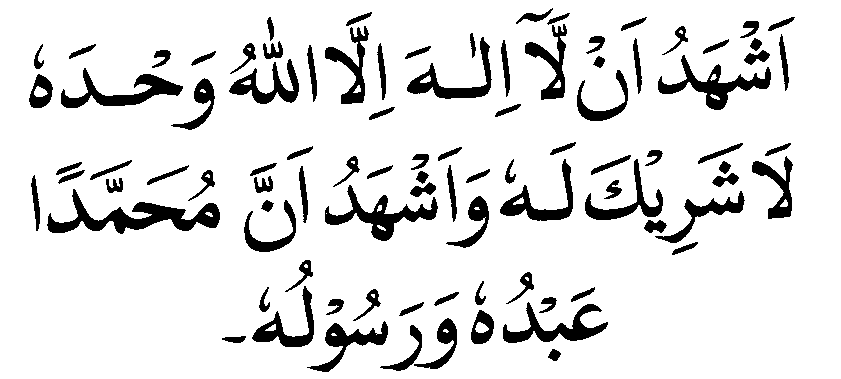
Translation: I bear witness that there is none worthy of worship but Allah and I bear witness that Mohammad (S.A.W) is the servant and messenger of Allah.
Third Kalimah Tamjeed (The Code of Glory of Allah).
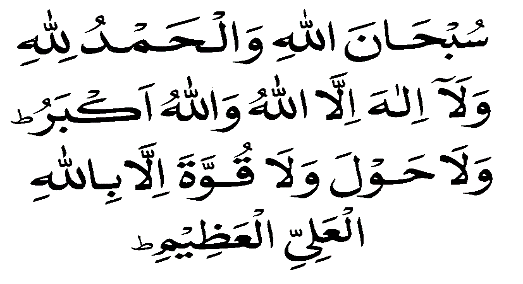
Translation: Glory be to Allah, all praise be to Allah, there is none worthy of worship but Allah, Allah is the greatest. And the power and strength is only from Allah, The most High, The most Great.
Fourth Kalimah Tauheed (The code of Oneness of Allah)
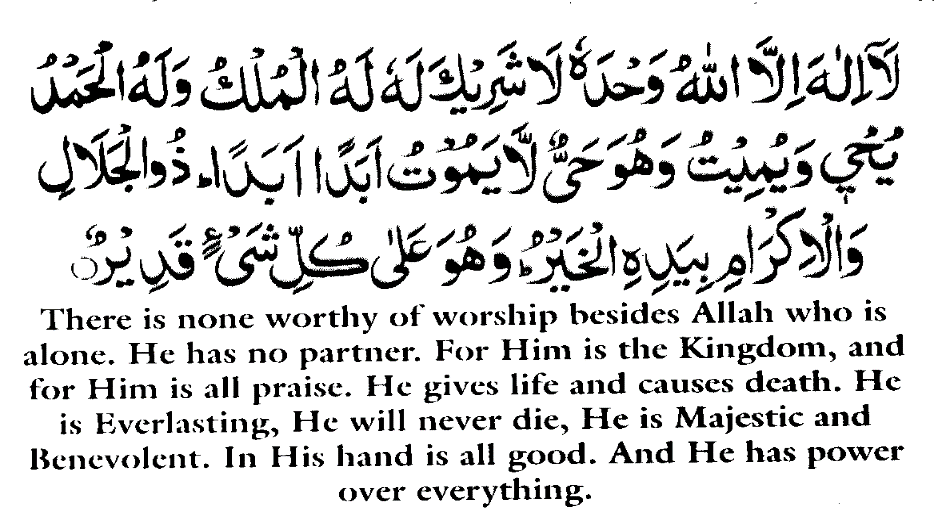
Iman e Mujmal
Iman e Mufassal

Asma ul Husna:
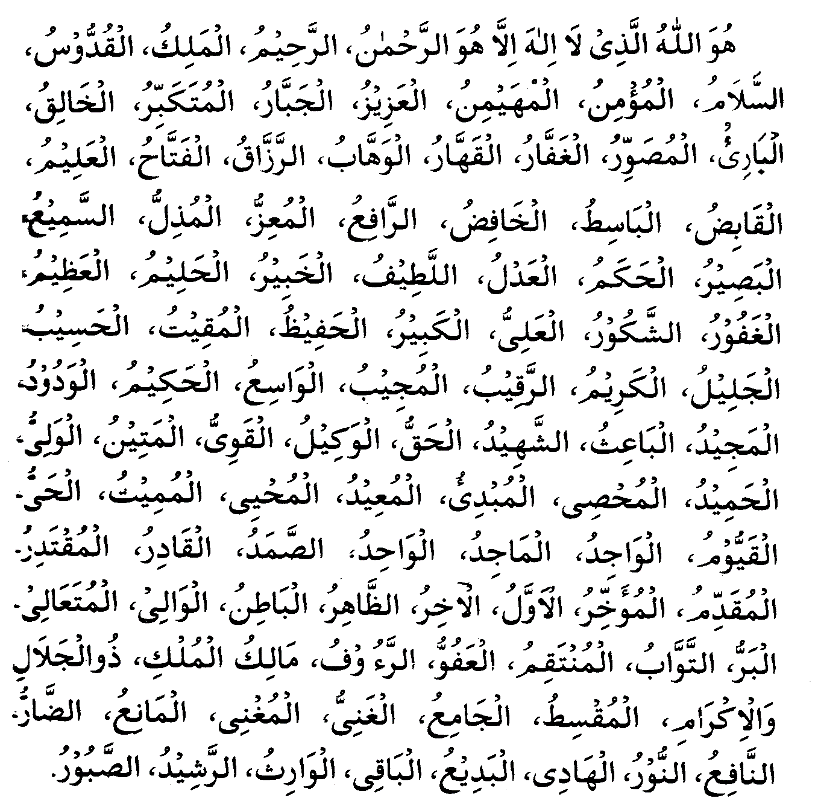
Islamic Knowledge:
Q 1. Who are you?
Ans. We are Muslims (Alhamdulillah).
Q 2. What is your religion?
Ans. Our religion is Islam.
Q 3. What does Islam teach?
Ans. Islam teaches that none is worthy of worship but Allah and Muhammad (P.B.U.H) is the servant
and messenger of Allah.
Q 4. What is the Kalimah of Islam?
Ans. The Kalimah of Islam is
Q 5. Who created us?
Ans. Allah Ta’aala created us.
Q 6. Who created the sun, the moon, the earth, the skies, and everything else?
Ans. Allah Ta’aala created the sun, the moon, the earth, the skies, and everything else.
Q 7. Who provide us with our livelihood?
Ans. Allah Ta’aala provides us with our livelihood.
Q 8. Who listen to our Duaas?
Ans. Allah Ta’aala listen to our Duaas.
Q 9. Who gives life and takes death?
Ans. Allah Ta’aala gives life and takes death.
Q10. Before whom do we bow our heads?
Ans. We bow our heads before Allah only.
Q11. Whose book is the Qur’aan?
Ans. The Qur’aan is the Book of Allah.
Q12. What does the Qur’aan teaches?
Ans. The Qur’aan teaches all the good of this world and hereafter.
Q13. Will there be life after death?
Ans. Yes, there will be life after death.
Q14. What are Angel?
Ans. Angel are the creation of Allah made from light.
Q15. How many Angels are there?
Ans. There are countless Angels only Allah knows their number.
Q16. How many well-known angels are there?
Ans. There are four well known Angels.
Q17. What are the names of four well known angels?
Ans. The names of the four well known Angels are
Hazrat Jibra’eel (A.S)
Hazrat Mikaa’eel (A.S)
Hazrat Israafeel (A.S)
Hazrat Izra’eel (A.S)
Q18. How many things make up the foundation of Islaam?
Ans. Five things make up the foundations of Islaam. They are
Imaan
Salaah (Prayer)
Fasting
Zakaah
Hajj
Q19. What is the most important act of worship in Islaam?
Ans. The most important act of worship in Islaam is Salaah.
Q20. During which month is Fasting Fardh?
Ans. Fasting is Fardh during the month of Ramadhan.
Q21. Where do Muslims go to perform Hajj?
Ans. Muslims go to Makkah to perform Hajj.
Q22. How long did it take for the Qur’aan to be revealed?
Ans. The Qur’aan was revealed in twenty three years.
Q23. How many juz (sections) are there in Qur’aan?
Ans. There are thirty juz in the Quran.
Q24. How many Surahs (chapters) are there in the Qur’aan?
Ans. There are one hundred and fourteen Surahs in the Qur’aan.
Q25. What is the name of gatekeeper of Jannah?
Ans. The name of the gatekeeper of Jannah is Ridwaan.
Q26. What is the name of the gatekeeper of Jahannam?
Ans. The name of the gatekeeper of Jahannam is Maalik.
Q27. Which Nabi is known as Abul Bashar (the father of mankind)?
Ans. Aadam (A.S) is known as Abul Bashar (the father of mankind).
Q28. For how many years did Nooh (A.S) invite his people to Islaam?
Ans. Nooh (A.S) invited his people to Islaam for 950 years.
Q29. What punishment was given to the people of Nooh (A.S)?
Ans. The people of Nooh (A.S) were punished by floods.
Q30. What did Nooh (A.S) do to be saved from the punishment?
Ans. Nooh (A.S) built an Ark by the command of Allaah.
Q31. On which mountain did the ark of Nooh (A.S) settle?
Ans. The Ark of Nooh (A.S) settled on Mount Judi.
Ibadaat:
Performing Wudu
1. Read 
2.Wash hands till wrist 3 times.
3. Rinse your mouth 3 times.
4. Rinse your nose 3 times.
5. Wash your face 3 times.
6. Wash your hand till elbow 3 times (first right than left).
7. Rub your head, ears and nape once.
8. Wash your feet with ankle 3 times (first right than left).
Faraidh of Wudu
1. Wash your face.
2. Wash your hands till elbow (first right than left).
3. Rub one fourth of your head with wet hands.
4. Wash your feet till ankle (first right than left)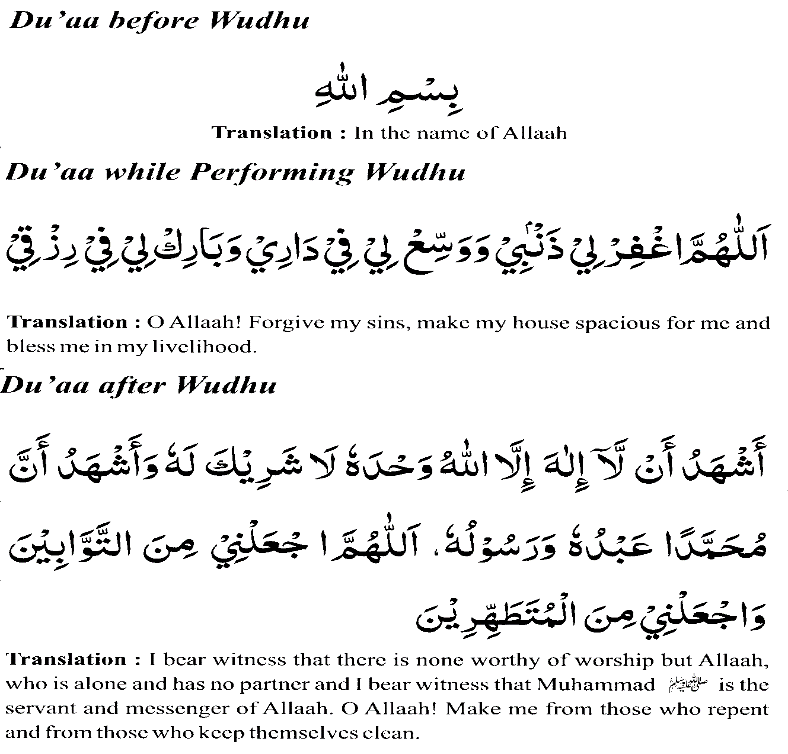
Daily Five Prayers
|
Fajr (4 Rakaahs) |
Zuhr (12 Rakaahs) |
Asr (8 Rakaahs) |
Maghrib (7 Rakaahs) |
Isha (17 Rakaahs) |
Words of Salaah
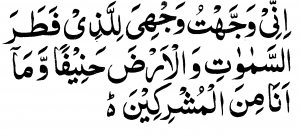
Translation: I being upright and Muslim and have turned my face
towards Him, Who created the Heavens and the Earth,
and I am not one of those who ascribe partners with Him.
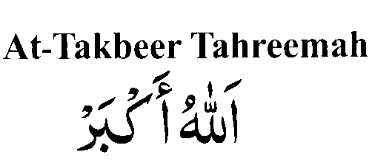
Translation: Allah is the greatest
Translation: All Glory to You, O Allah! And Praise be to You,
and Blessed is Your Name, and Exalted is Your Majesty,
and none is worthy of worship besides you.
Translation: I seek refuge (protection) with Allah from the accursed devil (satan).

Translation: In the Name of Allah I begin, The Compassionate The Merciful.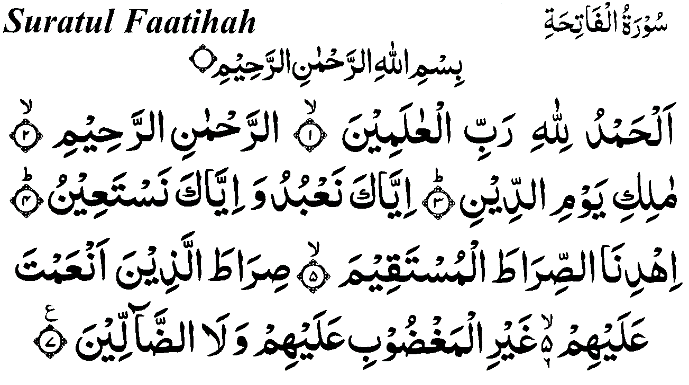
Translation: All praise is for Allah, Lord of the Universe.
The Compassionate The Merciful. Master of the Day of
Judgment. You alone we worship and to You alone we
turn for help. Guide us to the straight path. The path of
those whom You have favored, Not of those who
incurred (earned) Your wrath and nor of those who have
gone astray.
Translation: Say, He is Allah, The One. The Eternal Allah.
He begot none, nor was He begotten. None is equal to Him.
Translation: Say, I take refuge with the Lord of daybreak.
From the evil of what He has created. And from the evil of
darkness when it gathers. And from the evil of those who
blow on knots. And from the evil of an envier when he envies.
Translation: Say, I take refuge with the Lord of men. The
King of men. The God of men. From the evil of those who
whisper, who whisper in human hearts. From jinn and men.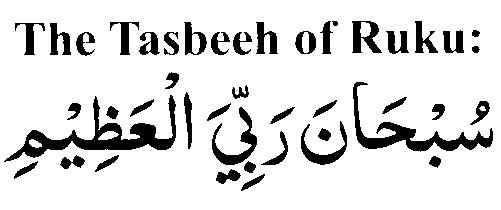
Translation: All Glory to my Lord, The Great.
Translation: Allah listens to him who praises Him.
Translation: O our Lord! All praise is for You.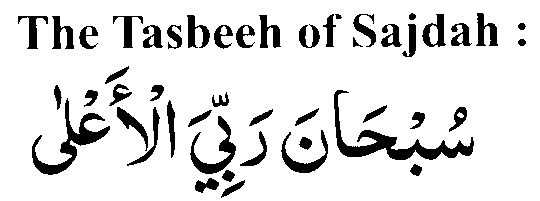
Translation: All Glory to my Lord, The Most High.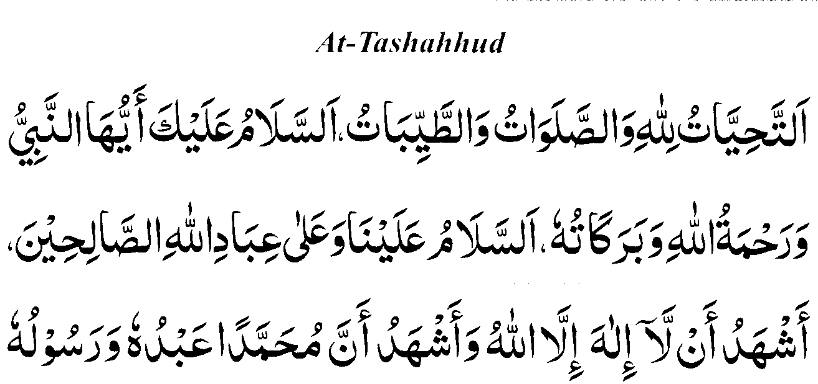
Translation: All Reverence (honor), all Worship and Glory is
for Allah. O Prophet! Peace be upon You, and Mercy,
and Blessings of Allah. Peace be upon us and righteous servants
of Allah. I bear witness that there is none worthy of worship but
Allah and I bear witness that Muhammad (S.A.W) is His Servant
and Messenger.
Durood e Ibrahimi: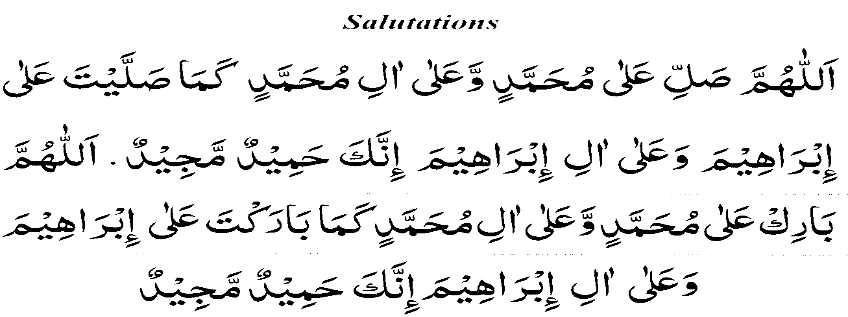
Translation: O Allah! Shower Your blessings upon Muhammad (S.A.W)
and the followers of Muhammad (S.A.W) as You showered Your
blessings upon Ibrahim (A.S) and the followers of Ibrahim (A.S). Verily!
You are Praiseworthy, Glorious.
O Allah! Shower Your mercy upon Muhammad (S.A.W) and the followers
of Muhammad (S.A.W) as You showered Your mercy upon Ibrahim (A.S)
and the followers of Ibrahim (A.S). Verily! You are Praiseworthy, Glorious.
Duaa after Durood:
Translation: O Allah! I have been very unjust to myself and
no one can forgive sins but You, so forgive me with Your
forgiveness, and have mercy upon me. You are the most Forgiving
The most Merciful.
Translation: Peace be upon you and mercy of Allah.
Duaa after Salaam:
Translation: O Allah! You are the source of peace and from You comes
peace. Great are Your blessings, O Lord of Majesty and Honor. 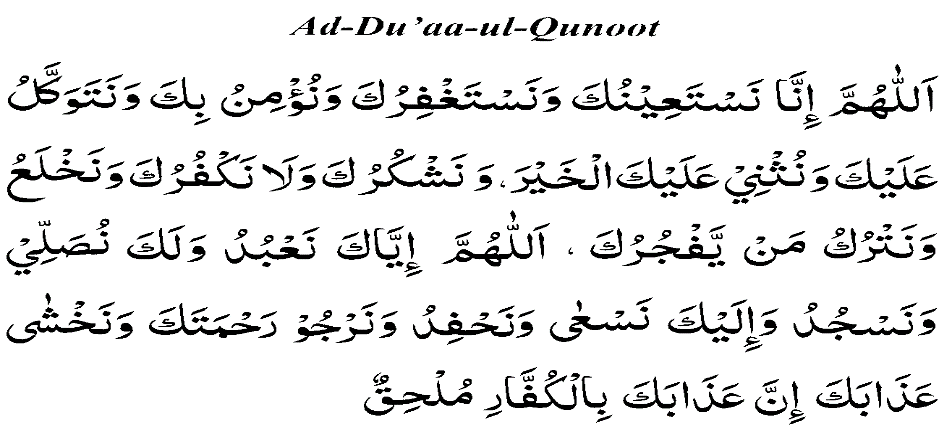
Translation: O Allah! We beg You for help, and we ask Your forgiveness,
and we believe in You, and we put our trust in You, and we praise You in
the best manner, and we thank You, and we are not ungrateful to You,
and we cast off and leave one who disobeys You, O Allah You alone we
serve and to You do we pray and we prostrate, and to You do we flee,
and we are quick, and we hope for Your mercy, and we fear Your
punishment. No doubt Your punishment overtakes the unbelievers.
Ahadith:
Hadith 1

Hadith 2

Hadith 3

Hadith 4

Hadith 5

Hadith 6

Hadith 7

Hadith 8
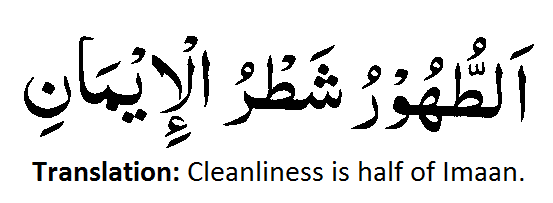
Hadith 9

Hadith 10

Hadith 11

Hadith 12

Hadith 13
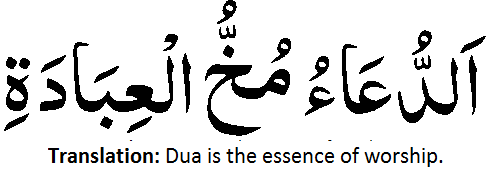
Hadith 14

Hadith 15

Hadith 16

Hadith 17

Hadith 18

Hadith 19

Hadith 20

Duaas:
Duaa before sleeping

Duaa after waking up

Sunnah way of sleeping
1. Sleep with Wudu.
2. Dust the bed 3 times.
3. Lay down on right side with right hand under the cheek.
4. Recite ‘’Subhan Allah’’ 33 times, ‘’Alhamdulillah’’33 times, ‘’Allah u Akbar’’ 34 times.
5. Recite the Duaa before sleeping. Duaa before eating
Duaa before eating
If One forgets Duaa before eating

Duaa after eating

Sunnah way of eating
1. Spread out Cloth (Daster khwan) on the floor.
2. Wash hands before eating.
3. Read Duaa before eating.
4. Eat with Right hand.
5. Not to lean while eating.
6. Not to find any fault in food.
7. Clean the plate and lick the fingers.
8. Read Duaa after eating.
9. Wash hands and rinse the mouth after eating.
Duaa before drinking water

Duaa after drinking water

Sunnah way of drinking water
1. Take glass in right hand
2. To sit.
3. Look in to the water before drinking.
4. Read duaa before drinking.
5. Drink in three breaths (minimum).
6. Read duaa after drinking.
Duaa for entering the toilet

Duaa for leaving the toilet

Sunnah way of using the toilet
1. To cover the head.
2. To enter wearing slippers.
3. To recite the Duaa before entering.
4. To enter with left foot.
5. Not to sit with face or back towards Qibla (Kabah).
6. Not to talk.
7. To wipe or wash with left hand.
8. To wash hands properly with soap after using the toilet.
9. To come out with right foot.
10. To recite Duaa after coming out.
Duaa for leaving the house

Duaa for entering the house

Sunnah way of leaving the house
1. To make Salaam before leaving.
2. To leave with the left foot.
3. To recite Duaa for leaving the house.
Sunnah way of entering the house
1. To recite the Duaa for entering.
2. To enter with right foot.
3. To say Salaam to the people of the house.
Duaa for entering the Masjid

Duaa for leaving the Masjid

Sunnah way of entering the Masjid
1. To remove the left shoe first then the right one.
2. To enter the Masjid with right foot.
3. To recite Duaa for entering the Masjid.
Sunnah way of leaving the Masjid
1. To leave the Masjid with left foot.
2. To recite Duaa for leaving the Masjid.
3. To wear the right shoe first then the left one.
Seerah tun Nabi (S.A.W):
1. What is the name of our Prophet/Nabi (S.A.W)?
A. Our Prophet/Nabi name is Hazrat Muhammad (S.A.W).
2. His father’s name?
A. His father’s name was Abdullah.
3. His mother’s name?
A. His mother’s name was Aaminah.
4. His grandfather’s name?
A. His grandfather’s name was Abul Muttalib.
5. His grandmother’s name?
A. His grandmother’s name was Faatimah.
6. His uncle’s name who took care of Him?
A. The uncle who took care of Him was Abu Taalib.
7. Where was our Holy Prophet/Nabi (S.A.W) born?
A. Our Nabi (S.A.W) was born in Makkah.
8. When was our Holy Prophet/Nabi (S.A.W) born?
A. Our Nabi (S.A.W) was born on Monday, during the month of Raee’ul Awwal.
9. How many sons did our Nabi (S.A.W) have?
A. Our Nabi(S.A.W) had 3 sons.
Abdullah (R.A)
Qasim (R.A)
Ibraheem (R.A)
10. How many daughters did our Nabi (S.A.W) have?
A. Our Nabi(S.A.W) had 4 daughters
Zaynab(R.A)
Ruqayyah(R.A)
Ummu Kulthoom(R.A)
Faatimah(R.A)
11. What was the age of our Nabi Muhammad (S.A.W)?
A. Our Nabi Muhammad (S.A.W) was sixty three (63) years of age.
12. At what age did Nabi Muhammad (S.A.W) becomes Nabi?
A. Our Nabi (S.A.W) become a Nabi at the age of forty (40).
13. How many years did our Nabi (S.A.W) live in Makkah?
A. Our Nabi Muhammad (S.A.W) lived for fifty three (53) years in Makkah.
14. How many years did our Nabi Muhammad (S.A.W) live in Madinah?
A. Our Nabi Muhammad (S.A.W) lived for ten (10) years in Madinah.
15. Who was the last Nabi?
A. The last Nabi was our Nabi Muhammad (S.A.W).
16. Will another Nabi come after our Nabi Muhammad (S.A.W)?
A. No Nabi will come after our Nabi Muhammad (S.A.W).
17. What are the people called to whom a Nabi is sent?
A. The people to whom a Nabi is sent are called his Ummah.
18. We are the Ummah of which Nabi?
A. We are the Ummah of Nabi Muhammad (S.A.W). Alhamdulillah!
19. Which Arab tribe did our Nabi Muhammad (S.A.W) belong to?
A. Our Nabi Muhammad (S.A.W) belong to the Quraysh tribe.
20. What was the name of maternal grandfather of our Nabi Muhammad (S.A.W)?
A. His maternal grandfather’s name was Wahab bin Abd Manaaf.
21. What was the name of maternal grandmother of our Nabi Muhammad (S.A.W)?
A. His maternal grandmother’s name was Barrah.
22. When did our Nabi (S.A.W)’s father pass away?
A. His father passed away before his birth.
23. How old was our Nabi (S.A.W)’s mother pass away?
A. Our Nabi (S.A.W) was six years old when his mother passed away.
24. With whom did our Nabi (S.A.W) live after his mother passed away?
A. Our Nabi (S.A.W) lived with his grandfather, Abdul Muttalib after his mother passed away.
25. How old was our Nabi (S.A.W) when his grandfather passed away?
A. Our Nabi (S.A.W) was eight years old when his grandfather passed away.
26. With whom did our Nabi (S.A.W) live after his grandfather passed away?
A. Our Nabi (S.A.W) lived with his uncle, Abu Taalib after his grandfather passed away.
27. Where was the first verse of the Qur’aan revealed to our Nabi (S.A.W) ?
A. The first verse of the Qur’aan was revealed to our Nabi (S.A.W) in the cave of Hira.
28. What did our Nabi (S.A.W) do in the cave of Hira?
A. Our Nabi (S.A.W) used to worship Allah in the cave of Hira.
29. What is leaving one place to settle in another for the sake of Deen called?
A. Leaving one place to settle in another for the sake of Deen is called Hijrah.
30. Where do Muslims go to in the first Hijrah?
A. The Muslims went to Abyssinia in the first Hijrah.


